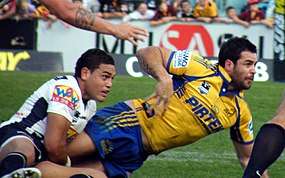Eric Grothe Jr.
Eric Raymond Grothe (born 15 March 1980) is an Australian former professional rugby league footballer who played in the 2000s and 2010s. A New South Wales State of Origin and Australia national representative wing, he played in the National Rugby League, largely for Sydney club, Parramatta Eels, with whom his father, Eric Grothe Sr., achieved legendary status in the 1980s. Grothe Jr. also spent three seasons with the Sydney Roosters, and at the end of his career was contracted to the Cronulla-Sutherland Sharks.
 Grothe playing for Parramatta in 2009 | ||||||||||||||||||||||||||||||||||||||||||||||||||||||||||||||||||||||||||||||
Personal information | ||||||||||||||||||||||||||||||||||||||||||||||||||||||||||||||||||||||||||||||
|---|---|---|---|---|---|---|---|---|---|---|---|---|---|---|---|---|---|---|---|---|---|---|---|---|---|---|---|---|---|---|---|---|---|---|---|---|---|---|---|---|---|---|---|---|---|---|---|---|---|---|---|---|---|---|---|---|---|---|---|---|---|---|---|---|---|---|---|---|---|---|---|---|---|---|---|---|---|---|
| Full name | Eric Raymond Grothe | |||||||||||||||||||||||||||||||||||||||||||||||||||||||||||||||||||||||||||||
| Born | 15 March 1980[1] Sydney, New South Wales, Australia | |||||||||||||||||||||||||||||||||||||||||||||||||||||||||||||||||||||||||||||
Playing information | ||||||||||||||||||||||||||||||||||||||||||||||||||||||||||||||||||||||||||||||
| Height | 194 cm (6 ft 4 in)[1] | |||||||||||||||||||||||||||||||||||||||||||||||||||||||||||||||||||||||||||||
| Weight | 107.5 kg (16 st 13 lb)[1] | |||||||||||||||||||||||||||||||||||||||||||||||||||||||||||||||||||||||||||||
| Position | Wing | |||||||||||||||||||||||||||||||||||||||||||||||||||||||||||||||||||||||||||||
| ||||||||||||||||||||||||||||||||||||||||||||||||||||||||||||||||||||||||||||||
Background
Grothe was born in Sydney, New South Wales, Australia and played for junior clubs Mounties and Eagle Vale.
Playing career
In the 1999 NRL season, Grothe made his first grade debut for the Parramatta Eels as a 19-year-old against the North Queensland Cowboys at Parramatta Stadium in round 19 which ended in a 24-12 victory.
Grothe scored his first try in the top grade the following week as Parramatta defeated Western Suburbs 68-10. Grothe played in Parramatta's qualifying final victory over the Newcastle Knights, scoring a try in a 30-16 win. Grothe made 9 appearances the following season before departing Parramatta. Grothe sat out the entire 2001 NRL season.
Grothe returned to rugby league in 2002 with the Sydney Roosters. Grothe only played eleven top grade games for the club over two seasons and did not play in the 2002 premiership winning team or the 2003 side which reached the grand final but lost to the Penrith Panthers.
Grothe then rejoined Parramatta for the 2004 NRL season. Grothe starred that year and also in the following year when he became a City representative in 2005. At the end of the 2005 NRL season, Grothe finished as Parramatta's top try scorer as the club won the minor premiership. Parramatta were tipped to reach the 2005 NRL Grand Final but suffered a shock 29-0 loss to North Queensland in the preliminary final at Telstra Stadium with Grothe playing on the wing.[4]
At the 2005 Dally M Awards, Grothe was named winger of the year. At the end of the season Grothe played for the Kangaroos, becoming, along with his father, Eric, Snr., the 8th father-son combination to represent Australia.[5]
Grothe was selected to play for New South Wales on the wing in all three games of the 2006 State of Origin series, scoring two tries in Game 3. Grothe is possibly more famous for punching Justin Hodges in the face during an on-field scuffle between the former roommates.
In the 2007 NRL season, Grothe made 23 appearances and scored 11 tries as Parramatta finished 5th and qualified for the finals. Grothe played in the club's 26-10 preliminary final loss against Melbourne in which Grothe scored a try.[6]
With the arrival of new coach Daniel Anderson in 2009, Grothe was at his powerful and explosive best. Anderson has something of a history with Grothe, having coached him as a 14-year-old in the Harold Matthews Cup back in 1995. Parramatta reached the 2009 NRL Grand Final against the Melbourne Storm. Grothe played on the wing, scoring a dominant try in the Eels' loss. Many believe that if the Eels had have won, Grothe may have received the Clive Churchill medal due to his solid grand final performance.
On 13 December 2010, Grothe announced his retirement from football after failing to overcome an injury that kept him sidelined for most of the 2010 NRL season.[7]
On 25 October 2013, Eric Grothe announced his plans to return to rugby league after being out of the NRL for 3 years. On 5 November 2013, Eric Grothe signed a one-year contract with the Cronulla-Sutherland Sharks for the 2014 NRL season. His NRL return was hampered by a devastating lower back injury that Grothe suffered early in the 2014 season.[1]
Outside of football
Grothe continued to showcase his musical talents as a regular member of the cover band on Channel Nine's The NRL Footy Show.
He also had an original band called Shinobi with his brother Daniel and mates Darren Stapleton and Wayne Langfield. Eric writes the music & lyrics for their songs. Shinobi is registered on Triple J Unearthed with track "Enemy" at Number 13.[8]In November 2007, the band was snapped up by booking agent the Harbour Agency, but after Eric retired from football, he took his music to another level by writing and recording Shinobi’s debut album ‘Against The Brave’ from which the title track & others received large doses of mainstream airplay on Triple M, Triple J, Channel V and RAGE as well as various other music stations and programs.
Grothe Jr. was in a relationship with ex-bardot singer Sophie Monk for over two years before he broke up with her in November of 2016.
Grothe Jr. now runs a podcast with his father titled UnderGrothe and also runs a successful health and fat loss business as well as a hilarious instagram account.[9]
References
- "Eric Grothe Jr". sharks.com.au. Cronulla-Sutherland Sharks. Archived from the original on 25 June 2014. Retrieved 21 August 2014.
- Rugby League Project
- NRL Stats
- "Nathan Hindmarsh on Parramatta's last table topping team". Fox Sports.
- "Grothe follows father's footsteps into green and gold" By Jessica Halloran and AAP (2005-10-26) smh.com.au
- "Melbourne v Parramatta". SMH.
- "Eric Grothe Jr quits in stunning blow to Parramatta Eels" 13 December 2010 The Daily Telegraph (Sydney)
- "Archived copy". Archived from the original on 1 March 2012. Retrieved 25 November 2007.CS1 maint: archived copy as title (link)
- https://www.zerotackle.com/round-7-guest-tipper-eric-grothe-jr-32625/